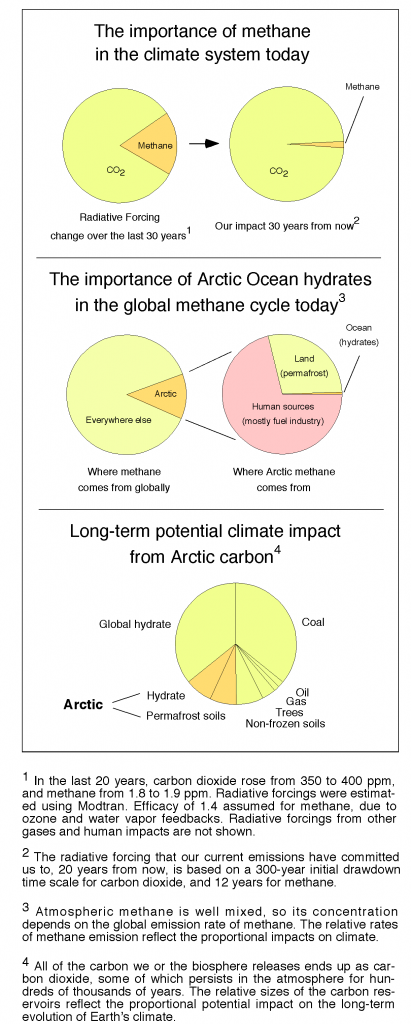Global Warming: The Science and Modeling of Climate Change is a free online adaptation of a college-level class for non-science majors at the University of Chicago (textbook, video lectures). The class includes 33 short exercises for playing with on-line models, 5 “number-cruncher” problems where you create simple models from scratch in a spreadsheet or programming language, and 8 “explainer” assignments where you explain some concept as you would to a smart 11-year old child (short, simple, clear), and exchange these with other students in the class for feedback. The discussion forums are very lively, as thousands of people from around the world make their way through the video lectures and exercises, lots to chat about. This is our third run of the class, so we’re getting the kinks out. We hope you find it useful. September 29 – December 31 2014.
Archives for September 2014
The story of methane in our climate, in five pie charts
On arguing by analogy
Climate blogs and comment threads are full of ‘arguments by analogy’. Depending on what ‘side’ one is on, climate science is either like evolution/heliocentrism/quantum physics/relativity or eugenics/phrenology/Ptolemaic cosmology/phlogiston. Climate contrarians are either like flat-earthers/birthers/moon-landing hoaxers/vaccine-autism linkers or Galileo/stomach ulcer-Helicobacter proponents/Wegener/Copernicus. Episodes of clear misconduct or dysfunction in other spheres of life are closely parsed only to find clubs with which to beat an opponent. Etc. Etc.
While the users of these ‘arguments’ often assume that they are persuasive or illuminating, the only thing that is revealed is how the proposer feels about climate science. If they think it is generally on the right track, the appropriate analogy is some consensus that has been validated many times and the critics are foolish stuck-in-the-muds or corporate disinformers, and if they don’t, the analogy is to a consensus that was overturned and where the critics are the noble paradigm-shifting ‘heretics’. This is far closer to wishful thinking than actual thinking, but it does occasionally signal clearly who is not worth talking to. For instance, an article pretending to serious discussion on climate that starts with a treatise about Lysenkoism in the Soviet Union is not to be taken seriously.
Since the truth or falsity of any scientific claim can only be evaluated on it’s own terms – and not via its association with other ideas or the character of its proponents – this kind of argument is only rhetorical. It gets no-one closer to the truth of any particular matter. The fact is that many, many times, mainstream science has survived multiple challenges by ‘sceptics’, and that sometimes (though not at all often), a broad consensus has been overturned. But knowing which case is which in any particular issue simply by looking for points of analogy with previous issues, but without actually examining the data and theory directly, is impossible. The point being that arguments by analogy are not persuasive to anyone who doesn’t already agree with you on the substance.
Given the rarity of a consensus-overturning event, the only sensible prior is to assume that a consensus is probably valid absent very strong evidence to the contrary, which is incidentally the position adopted by the arch-sceptic Bertrand Russell. The contrary assumption implies there are no a priori reasons to think any scientific body of work is credible which, while consistent, is not one that I have ever found anyone professing in practice. Far more common is a selective rejection of science dependent on other reasons and that is not a coherent philosophical position at all.
Analogies do have their place of course – usually to demonstrate that a supposedly logical point falls down completely when applied to a different (but analogous) case. For instance, an implicit claim that all correct scientific theories are supported by a unanimity of Nobel Prize winners/members of the National Academies, is easily dismissed by reference to Kary Mullis or Peter Duesberg. A claim that CO2 can’t possibly have a significant effect solely because of its small atmospheric mixing ratio, can be refuted as a general claim by reference to other substances (such as arsenic, plutonium or Vitamin C) whose large effects due to small concentrations are well known. Or if a claim is made that all sciences except climate science are devoid of uncertainty, this is refuted by reference to, well, any other scientific field.
To be sure, I am not criticising the use of metaphor in a more general sense. Metaphors that use blankets to explaining how the greenhouse effect works, income and spending in your bank account to stand in for the carbon cycle, what the wobbles in the Earth’s orbit look like if the planet was your head, or conceptualizing the geologic timescale by compressing it to a day, for instance, all serve useful pedagogic roles. The crucial difference is that these mappings don’t come dripping with over-extended value judgements.
Another justification for the kind of analogy I’m objecting to is that it is simply for amusement: “Of course, I’m not really comparing my opponents to child molesters/food adulterers/mass-murderers – why can’t you take a joke?”. However, if you need to point out to someone that a joke (for adults at least) needs to have more substance than just calling someone a poopyhead, it is probably not worth the bother.
It would be nice to have a moratorium on all such analogical arguments, though obviously that is unlikely to happen. The comment thread here can assess this issue directly, but most such arguments on other threads are ruthlessly condemned to the bore-hole (where indeed many of them already co-exist). But perhaps we can put some pressure on users of these fallacies by pointing to this post and then refusing to engage further until someone actually has something substantive to offer. It may be pointless, but we can at least try.
Unforced variations: September 2014
This month’s open thread. People could waste time rebunking predictable cherry-picked claims about the upcoming Arctic sea ice minimum, or perhaps discuss a selection of 10 climate change controversies from ICSU… Anything! (except mitigation).

